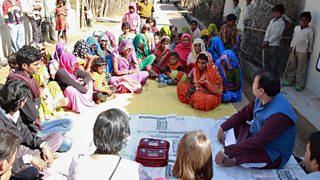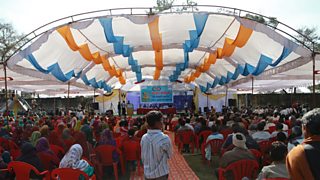‘I now know my rights’: preventing bonded labour in rural India
Aashish Yadav
Senior Project Manager for Ö÷²¥´óÐã Media Action in India
Tagged with:

A Ö÷²¥´óÐã Media Action listening group in Madhya Pradesh, India.
After a two year journey and countless stories of success, our bonded labour project is coming to an end.
The project, entitled Majboor Kisko Bola (Who are you calling helpless?), provides information to help support bonded labourers - workers forced to work for free, often indefinitely, while they pay off a debt to a contractor. Today we are hosting an event in New Delhi to celebrate the success of the project along with some of its beneficiaries and other stakeholders. We kicked off the discussion with a last week, which included experts on bonded labour from around the world.
In the last year the bonded labour project has seen numerous cases reported and redressed in its 110 listeners’ villages across 11 districts in three states. The programme has prompted more than 5000 grievances against employers, 3000 demands for minimum wages, 400 press articles by trained journalists and 200 stories of escape.
But what are the real stories behind these statistics? Recently I visited a number of villages in Madhya Pradesh.
While I travelled around our target communities, I heard many stories of people being freed from bondage, and others who were deterred from entering into it.
In one village I met a labourer with a pregnant wife and a young daughter. He told me that he had recently been kidnapped, stripped, assaulted and paraded before a crowd of people by another man in his village.

A Ö÷²¥´óÐã Media Action Listener Dialogue meeting in Panna, India.
“My contractor would not pay me”
When I asked him why he thought he was attacked, he told me, “I refused to work. I used to work as a labourer in the village, but my contractor would not pay me. When I would ask for my due, he would beat me up” he added, his eyes squinting in the heat.
“I felt horribly ashamed. I wanted to run away or kill myself.” he added.
After the assault, his father reported the incident to the local police but the case was not investigated. At that point, our project facilitator in the village contacted a local journalist who had attended Ö÷²¥´óÐã Media Action’s workshop, where he was trained in the legalities of bonded labour. The journalist immediately contacted the police station to inquire about the incident, the police registered a complaint and the accused were arrested.
No longer helpless
The young labourer told me “I may be weak but I am no longer afraid, because I know there are people from the NGOs and journalists who support me. I am no longer helpless”. His father added, “It has been due to the support of the bonded labour project team that we have been able to survive through this time. Otherwise I don’t think my son would have even been alive!"
The young labourer’s frail frame and his mud house which has no doors, make him vulnerable to another attack. However, now he understands the vulnerabilities he faces and is looking for work where his rights as a human being and rights as a labourer are respected. He proudly told me, “I now know my rights and no matter what happens to me, I will not let anyone take that away from me.”
This story reminded me that the strength of the bonded labour project lies in not just the radio programme but also the partnerships we make with journalists and others on the ground.
Related links
Follow Ö÷²¥´óÐã Media Action on and
